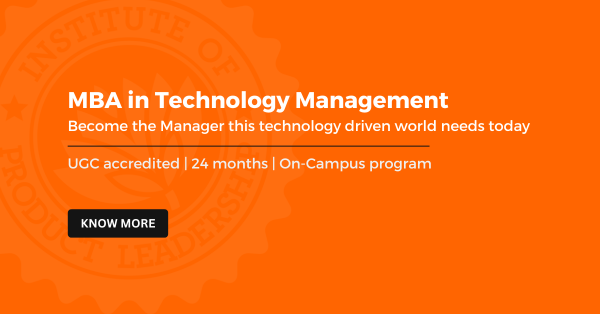MBA in Information Technology for Career Switchers
- Career
- 4 min read
In 2023 alone, more than 900,000 professionals in the US transitioned into tech careers without a traditional computer science education. Surprised? That’s the reality of today’s job market, where tech isn’t only for coders anymore.
If you’re stuck in a career that no longer excites you, or your industry feels like it’s going nowhere, you’re not alone. Many mid-career professionals are now choosing to make bold career switches, and an MBA in Information Technology Management is proving to be one of the smartest ways to do it.
Let’s break it down how this degree works, who it’s for, and what it can actually do for your career.
Key Takeaways:
- An MBA in Information Technology fills the gap between business strategy and tech leadership.
- It provides entry points to high-impact positions such as Product Manager, IT Consultant, and CIO.
- You don’t have to be a computer programmer, this degree has a focus on decision-making through tech.
- It’s perfect for mid-career professionals looking for a serious career transition into tech.
- It provides you with practical skills in digital transformation, analytics, and agile leadership.
Suggested Read: MBA vs MTech: Which One Should You Choose After BTech?
Top Careers After MBA in Information Technology
One of the best things about an MBA in IT is that it opens doors to roles that sit at the intersection of business strategy and tech innovation. You’re not just learning how tech works, you’re learning how to use it to make smarter business decisions.
Here are some top career options you can explore:
- IT Project Manager
Coordinate and lead large-scale tech initiatives for companies. You’re managing timelines, budgets, teams, and delivering results. - Product Manager (Tech)
Bridge the gap between tech and business teams. You’re the person making sure the right tech products are built with real market needs in mind. - Business Analyst
Use data and systems knowledge to find ways to improve processes and operations. A great fit for people who like both logic and creativity. - Technology Consultant
Help organizations solve tech challenges or implement new systems. You work with different clients, so the learning never stops. - Chief Information Officer (CIO)
A senior leadership role. You’ll be shaping how a company uses tech to drive growth and efficiency.
These roles are not just better paid, they also offer a lot more ownership, problem-solving, and creative freedom.
How an MBA in Information Technology Upskills You
Let’s say you’ve been working in operations, finance, or even HR for a few years. You know the business side of things, but now you want to switch gears and move into tech, or at least into a tech-enabled role. That’s where an MBA in IT shines.
Here’s what you really gain:
- Foundational Tech Knowledge
No, you don’t need to become a coder. But you’ll understand tech systems, databases, cybersecurity, and enterprise software – enough to make informed decisions and lead teams. - Business + Tech Strategy
Learn how to align IT with broader business goals. Whether it’s digital transformation or cloud adoption, you’ll speak both the boardroom and the tech room’s language. - Real-World Case Studies
Many programs use real industry projects to show how tech is applied in retail, finance, logistics, and more. It’s not just theory, it’s real practice. - Leadership & Communication
Tech alone won’t make you a leader. You’ll also work on negotiation, team management, and decision-making skills – all essential to lead cross-functional teams.
This combination is especially valuable if you want to move into managerial roles in tech-driven businesses, which, let’s face it, is almost every business today.
Is MBA in Information Technology Right for You?
Not everyone needs an MBA in IT. But it could be a great move if you check off most of the boxes below:
- You’re already working and want a structured career shift
Maybe you’ve hit a ceiling in your current field. You want to switch to a growing domain, but also need the credibility that comes with a degree. - You’re interested in tech but don’t want to become a programmer
You like solving problems and understanding how tech systems work, but you’re more drawn to the business and leadership side of things. - You want long-term career growth
An MBA in IT can propel you into future-proof careers. Technology keeps changing, and this degree ensures you remain up to date and ahead. - You value a strong network
MBA degrees frequently bring you in touch with alumni, recruiters, mentors, and incubators – all assets which prove particularly useful during an industry change.
Still unsure? Talk to someone who’s made a similar switch. You’ll probably find that many successful IT professionals didn’t start out in tech at all.
Skills You Gain from an MBA in Information Technology
This degree isn’t just about textbooks or certifications. It gives you real, applicable skills that are valuable in almost any industry.
Here’s a quick breakdown of what you’ll come out with:
- Digital Transformation Strategy
Learn how companies use cloud, AI, and automation to modernize and stay competitive – and how you can lead that change. - Data-Driven Decision Making
Use tools like Excel, SQL, and analytics dashboards to pull insights and make smarter business choices. - Agile Project Management
Understand how modern teams build software and products using agile and scrum methodologies. - Enterprise IT Systems
Learn about ERP, CRM, and cybersecurity systems that large organizations rely on every day. - Communication & Influence
Present your ideas clearly, get buy-in from stakeholders, and manage diverse teams, skills that matter in every leadership role.
Each of these skills is transferable across sectors– retail, healthcare, fintech, e-commerce, you name it.
Career Opportunities After MBA in IT Management
One of the biggest questions: what kind of jobs can you get?
The good news? A lot. Here are some of the most common job roles for graduates:
- IT Manager / Director
- Technology Consultant
- Digital Transformation Manager
- Chief Information Officer (CIO) – eventually
- Program Manager – Tech Implementation
- Business Analyst – IT Projects
- ERP Implementation Lead
- Data Strategy Manager
These roles exist across industries, from banking to retail to manufacturing, because every sector is becoming increasingly tech-driven.
Suggested Read: Which MBA Specialization Is Best for Engineers?
Career changes can feel risky. But so is being stuck in a job which no longer excites you. An MBA in Information Technology is not merely a degree—it’s a gateway to something new, something better.
And no, you don’t have to begin from square one. Your prior experience – be it in marketing, sales, education, or logistics counts.
So if you’re thinking of making the switch, ask yourself:
Are you ready to stop being a bystander to tech and start leading it?
Let me know if you’d like a visual chart comparing “Before and After MBA in IT careers” or a CTA section for a specific program.
Frequently Asked Questions (FAQs)
An MBA in Information Technology provides a broad range, allowing for careers in IT project management, product management, business analysis, and digital transformation leadership in industries such as finance, healthcare, e-commerce, and consulting.
Yes, it’s a great option for non-tech professionals who wish to transition into tech-enabled leadership opportunities without becoming technical specialists such as coders or developers.
Top jobs are IT Project Manager, Product Manager, Technology Consultant, Business Analyst, and CIO – roles that combine tech expertise with business strategy.
Yes. Most courses don’t need a degree in tech – only a willingness to learn how technology can fuel business growth and innovation.
You’ll develop skills in digital strategy, data analysis, agile project management, enterprise systems, and cross-functional leadership—all important for tech-influenced business careers.






